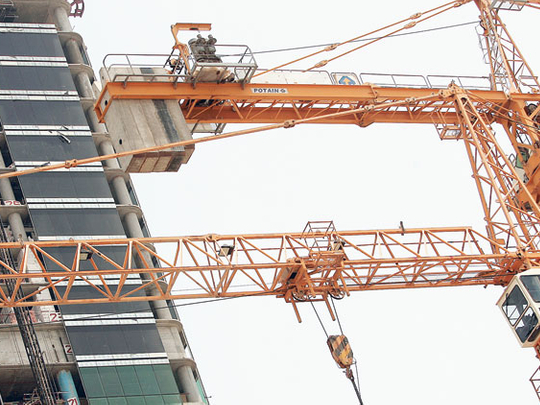
Dubai : Forty per cent is the new 100 per cent where local developers are concerned, or at least for those of whom who have stalled projects on their books and are now intent on reviving them.
In keeping with this knowledge, the developers are brushing off the dust on their project plans and actually starting to award construction contracts.
This should become more apparent in the post-Ramadan period as developers rush to meet Land Department and Real Estate Regulatory Agency guidelines that classify whether a project is ‘live' or is permanently grounded. This momentum shifting activity on the part of developers would have an immediate impact on the construction sector, but may not necessarily be the case for property investors in these projects.
"Applicable laws allow a developer to demand payment and enforce the right to be paid at any time, so long as the developer has complied with its obligations," Shahram Safai, partner at the local law firm of Afridi & Angell, said.
"The significance of the 40 per cent milestone of the project is to evidence that the developer is continuing with construction."
But the sudden rush of activity where their projects are concerned may signify developer motives that could place them at odds with their investors.
Once the 40 per cent mark is reached — or even as they approach it — developers can insist on investors recommitting to their payments irrespective of how long the project got delayed. (This is so as long as the promised completion date has not been missed, and where it is missed the developer has a valid reason.)
If the concerned investors are not willing to commit to revised payment schedules, they risk being named defaulters and thus lose any rights they may have on the property. The developers thus get to repossess a property to which instalments have been committed.
And when they believe the time is right they can sell it, or retain it on their books as property on lease. Either way, they are looking at a win-win situation.
"Such instances have happened in the recent past and will multiply as developers push their projects closer to the 40 per cent mark," said Samir Munshi, managing director at Silver Heights, which is into real estate services including investment.
"For the developers, it's a straight equation — build and they have multiple options to earn more money. Scrap the project and they will find themselves liable to meet investor demands on payment returns."
Munshi refers to a project in Dubai Sports City where the developer has got his construction well past the 50 per cent mark.
"However, there is one investor in the project who has paid 45 per cent of his installment who has now been served with a repossession notice.
"The developer has so far not been willing to come to any negotiations with the investor, who is left with no option but to pursue it in the courts. That only adds to his expenses at a time when he can least afford it."
But an investor who feels he is on the right still has some wriggle room. The Land Department will give a hearing to those purchasers to seek reasons on why they have defaulted on their payments.
"Alternatively, if the purchaser believes that the developer has not abided by its obligations, the purchaser may elect to sue the developer in court," said Safai.
The catch
40% mark equation
The 40 per cent project milestone is not a process that can be determined arbitrarily by the developer. It is determined by the Land Department and engineering consultants appointed by it, which should assure investors their side of the story will be held as well.
"It is the percentage of the total project that is completed and not just the number of floors [in a high-rise]," said Shahram Safai at Afridi & Angell.
The applicable laws (for example, Decree 6 of 2010) require that notice of demand for payment be sent by the developer to the purchaser with a copy to the Land Department.
If the purchaser still fails to pay within 30 days of such notice the developer may exercise his rights under law. These rights include: (i) terminating the contract and retaining 30 per cent of the paid amount if construction of the project has not commenced; (ii) terminating the contract and retaining 25 per cent of the purchase price if construction has commenced (but not reached 60 per cent); (iii) terminating the contract and retaining 40 per cent of the purchase price if construction has commenced but not reached 60 per cent; and (iv) terminating the contract if construction is at least 80 per cent and (a) retaining 40 per cent of the purchase price or (b) selling the unit at auction to recover the balance.
— M. N.












